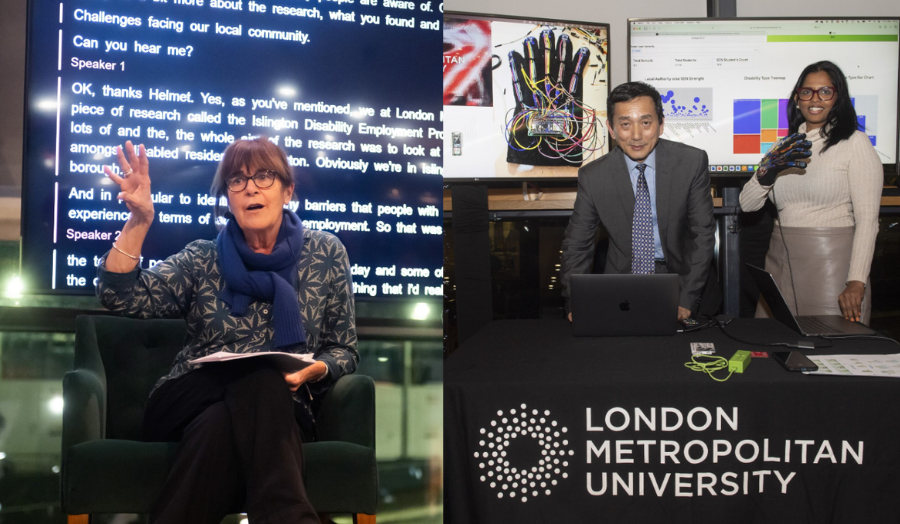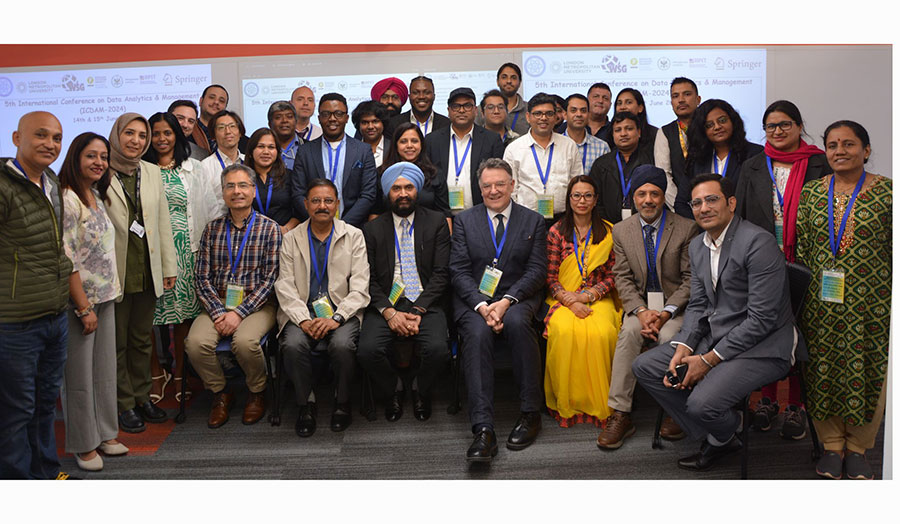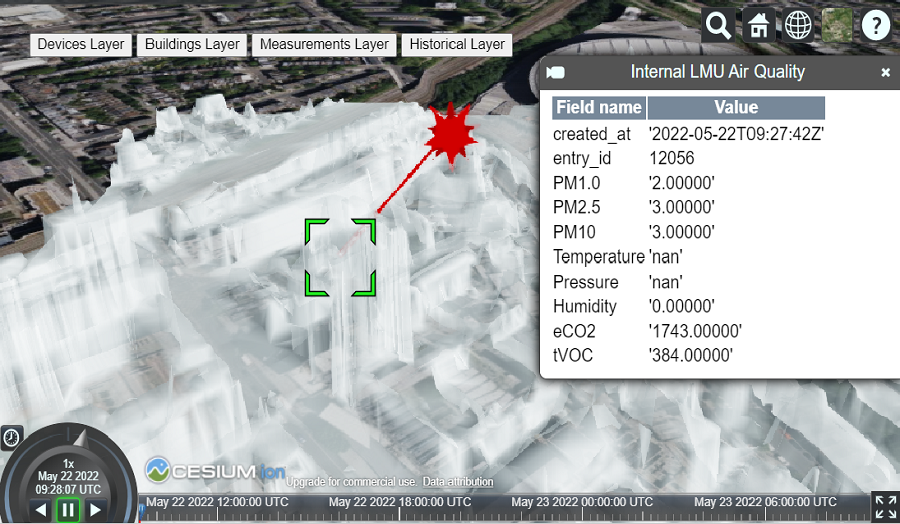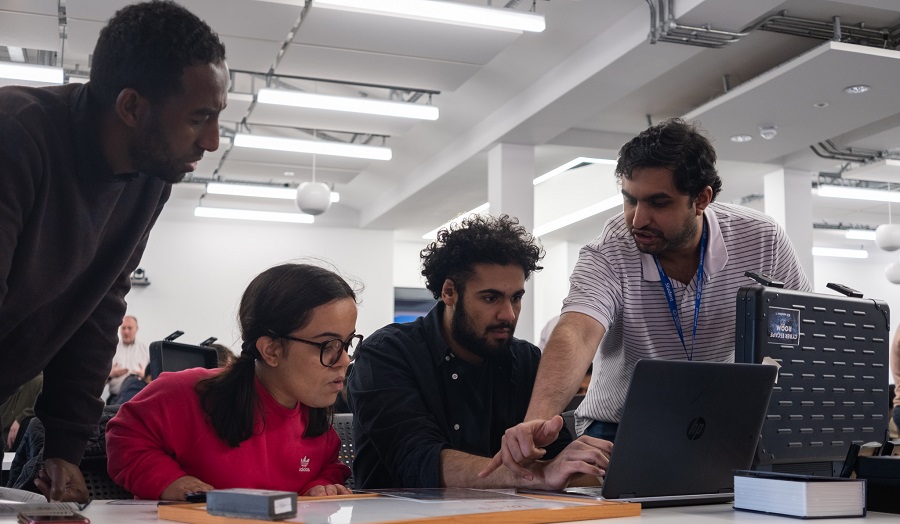Apply for this course
Please select when you would like to start:
If you're a UK applicant wanting to study full-time starting in September, you must apply via UCAS unless otherwise specified. If you're an international applicant wanting to study full-time, you can choose to apply via UCAS or directly to the University.
If you're applying for part-time study, you should apply directly to the University. If you require a Student visa, please be aware that you will not be able to study as a part-time student at undergraduate level.
Why study this course?
This Data Science BSc course offers a comprehensive introduction to the most important areas of the discipline, including data programming, statistical modelling, business intelligence, machine learning and data visualisation.
Developed with input from industry experts, this course covers all the necessary skills and competencies required to delve deeper into this fascinating field. By the end of the BSc degree, you’ll be ready to apply for rewarding roles in the data science and big data industries, as well as the many sectors and organisations that increasingly require data scientists.
Learn about the most important areas of data science
Gain a comprehensive understanding of data programming, statistical modelling, business intelligence, machine learning and data visualisation
Make use of our wealth of blended learning technologies
You'll have resources such as our virtual learning environment WebLearn, our library’s e-books and our online databases at your disposal
Learn how to use a huge number of digital tools
Gain proficiency in Spark, Kafka, Hadoop, Oracle, SQL Server, Linux, Apache Airflow, RStudio, Python - Jupyter, Tableau, and D3 technology
Course modules
The modules listed below are for the academic year 2024/25 and represent the course modules at this time. Modules and module details (including, but not limited to, location and time) are subject to change over time.
Year* 1 modules
Year 2 modules
Year 3 modules
Data Analysis
(core, 15 credits)This module introduces methods of analysing data using appropriate statistical software. Descriptive statistics and statistical techniques that are useful to present, analyse and make inferences about data are also introduced. A selection of suitable software (e.g. Excel, SPSS, R) will enable students to analyse data in order to make informed decisions.
Financial Mathematics
This module currently runs:autumn semester - Thursday afternoon
(core, 15 credits)
This module develops the mathematical and statistical tools that are used in the mathematics of finance. This module introduces the basic terminologies used in finance and develops the mathematical techniques to solve real-life problems in finance. The module will provide an introductory knowledge of Excel, and Excel built functions in financial computing. The application of suitable software (e.g. Excel) will enable students to solve financial problems in order to draw valid conclusions and make informed decisions.
Read full detailsFundamentals of Computing
This module currently runs:spring semester - Tuesday afternoon
(core, 15 credits)
Students will receive an introduction to the principles of information processing and an overview of the information technologies for digital data processing using computational and communication devices, including an initial understanding of the requirements for usability, quality, complexity, security and privacy of the developed solution. The students will obtain initial practical skills in modelling, design, implementation and testing of software systems for real-world application using a suitable programming language.
Read full detailsIntroduction to Information Systems
This module currently runs:autumn semester - Tuesday afternoon
(core, 15 credits)
Students will receive an introduction to the business environment and the role of information management and information systems within business.
The module develops an understanding of the Information Systems, the Software Development process and the basic technology underpinning these systems. This will include database management systems and the Internet. Students which will develop key skills and knowledge in the aspects of an information system, including databases, websites, and scripts with particular regard to usability.
• The module aims to provide an overview of the nature of organisations, their business models, and how key areas operate to meet business objectives. It introduces students to organisational culture, data, information and knowledge management, and the role of information in organisational decision making.
• Within the module the students will be given an appreciation of the effect of ICT on organisational performance, and a basic understanding of the processes of developing and maintaining information systems, software products and services.
• An introduction to underlying technologies (e.g., databases, Internet and Web) is embedded in the module, which also seeks to develop basic competence and confidence in the use of appropriate tools, techniques and academic and communication skills, with an underlining awareness of legal, social, ethical and professional issues.
Logic and Mathematical Techniques
This module currently runs:all year (September start) - Thursday morning
(core, 30 credits)
This module develops a range of mathematical techniques including set theory, logic, relations and functions, algebra, differentiation and integration. The techniques provide the foundation for further study of Mathematics, Computer Science and Computer Games Programming and Computer Systems Engineering.
Read full detailsProgramming
This module currently runs:all year (September start) - Tuesday morning
(core, 30 credits)
This is an introductory programming module, designed to develop interest, ability and confidence in using a programming language. Students will gain the basic knowledge and experience to solve simple programming problems using established techniques in program design, development and documentation. It is expected that on completion of this module, students will be able to design, implement and test object-oriented programs. The module also enables to self-study a popular programming language and obtain a completion certificate. The student is also expected to develop their confidence needed to program solutions to problems through a series of practical programming exercises.
Assessment: Multiple choice test (30%) + Programming certificate(10%) +Coursework (60%) [Pass on aggregate]
Read full detailsData Analytics
This module currently runs:autumn semester - Tuesday morning
(core, 15 credits)
This module introduces fundamental concepts and techniques of data analytics. The module covers descriptive statistics for exploratory data analysis, correlation analysis and linear regression model. A substantial practical element is integrated into the module to enable students to apply data analytics techniques for real world data analytical problems.
The aims of this module are to enable students to:
• gain a thorough understanding of fundamental concepts of data analytics
• acquire knowledge of descriptive statistics, correlation analysis, and linear regression analysis
• have knowledge of and gain understanding of the data analytics lifecycle
• develop practical data analytical skills to resolve real world data analytical problems
Data Engineering
This module currently runs:spring semester - Monday morning
(core, 15 credits)
This module provides an understanding of data engineering concepts, techniques and tools. It covers the basics of data modelling, storage, retrieval, and processing for data analysis needs. The module aims to provide a set of building blocks through which a complete architecture for modelling, storing and processing data can be constructed. It aims to enable students to apply the practical skills of data engineering techniques in the real world.
The aims of this module are to:
• provide students with an understanding of data engineering concepts and techniques
• enable students to appreciate various modern data engineering tools
• enable students to acquire fundamental knowledge and skills of data modelling, storage, retrieval, and processing for data analysis
• develop students with practical skills in applying tools and techniques to solve real world problems
Databases
This module currently runs:autumn semester - Wednesday morning
(core, 15 credits)
Introduces techniques for analysing, designing and implementing database systems. An understanding of data modelling and design concepts is provided and database programming language skills are taught. The practical aspect of developing database systems is emphasised and use is made of a widely-used commercial database system (e.g. Oracle) for this purpose.
The module will enable students to give an introduction to the issues governing the design and implementation of database systems. Theoretical aspects of designing sound database systems, as well as the practical aspects of implementing such systems are presented. This therefore allows students to understand, and put into practice, the techniques available for analysing, designing and developing database systems.
Read full detailsProfessional and Ethical Issues
This module currently runs:spring semester - Thursday afternoon
(core, 15 credits)
This module focuses on professional, social, ethical issues within the context of social responsibility and covers relevant computer laws (LSEPI) underpinning the Computing discipline. The focus of the module is empowering student to take their place in society as socially responsible professionals and allowing the exploration of self-awareness, empathy, self-efficacy and engagement in students
Assessment: Coursework (100%)
The aims of this module are to:
• Expose students to a range of professional and ethical issues to prepare them to develop their own response to working with a professional outlook.
• Prepare students for the world of work and equip them with the knowledge and appreciation of professional bodies, code of conducts and professional certifications.
• Provide students with knowledge and understanding of the regulations governing the digital environment (e.g. Internet) and social, ethical and professional issues (LSEPI) underpinning the Computing discipline.
Introduce students to academic research and research ethics, and to academic writing.
Programming with Data
This module currently runs:autumn semester - Tuesday afternoon
(core, 15 credits)
The module is designed to introduce data programming through various programming concepts related to data. The module covers data structures, selection, iteration, data input and output with error handling. In particular the module focuses on creating data science solutions for business applications. Programming language Python is integrated into the module practical element to prepare, analyse, process and present data science solutions.
- Students will gain knowledge and skills of the principles of data programming, design and coding.
- Develop programming skills for data manipulation and presentation.
- Develop skills to create data solutions for business applications using programming.
- Enhance skills for logical reasoning, problem solving and evaluation.
Smart Data Discovery
This module currently runs:spring semester - Friday morning
(core, 15 credits)
This module will enable students to understand the fundamental concepts of data science and appreciate key techniques of data science and its applications in a wide range of business context. Students will be exposed to data understanding, preparation, modelling, results evaluation and data visualisation techniques that can assist businesses in making effective data-driven decisions to improve productivity and consumer satisfaction. Students will be introduced to the practical application of tools and techniques required to perform data science projects in a modern business environment.
Read full detailsStatistical Methods and Modelling Markets
This module currently runs:all year (September start) - Monday afternoon
(core, 30 credits)
The module covers mathematical and statistical modelling techniques that are applied in making decisions in areas of finance. It also enables the student to investigate real-life statistical data. This module introduces important financial concepts and develops statistical modelling techniques. Statistical regression models are applied to financial data (e.g., credit scoring, default time analysis) and mathematical modelling of stock and option prices is investigated. A selection of suitable software (e.g., Excel, R, SPSS) will enable students to analyse data in order to make informed decisions. The students will develop skills in statistical and mathematical modelling of real data to aid future employability
Read full detailsArtificial Intelligence and Machine Learning
(core, 15 credits)This module surveys essential principles, methods, and techniques in AI and machine learning. It covers a broad range of AI topics such as problem solving, knowledge representation, logical and probabilistic inference, and machine learning using methods of automata theory, logics, probability theory and statistics. It discusses examples of intelligent systems and studies how to develop applications that can learn from experience such as expert systems, automatic classifiers and autonomous systems planning their actions and communicating in natural language. Students will be offered lectures, which introduce key concepts, explain main principles and techniques in AI, and demonstrate how to apply them in areas such as image recognition and price forecasting.
The workshop will provide practical sessions to help students understand the content of the lectures and build the necessary skills to develop AI-applications using suitable problem descriptions and datasets.
Big Data and Visualisation
This module currently runs:autumn semester - Thursday morning
(core, 15 credits)
This module provides an understanding of big data processing and visualisation approaches and challenges along with various techniques and technologies. It covers big data processing and basic visualisation concepts, different type of big data and real-time log analysis using charts, graphs, diagrams of 2D data. A substantial practical element is integrated into the module to enable students to apply big data processing, querying and visualisation techniques for real-world problems using cloud and desktop technologies.
The module aims are to:
• Enable students to gain further understanding of data streaming, processing and querying.
• Enable students to gain understanding of the fundamental concepts of data visualisation.
• Develop students’ practical skills in applying data processing and visualisation techniques for real world big data problems.
• Expose student’s expertise in data model visualisation techniques of different types of data and types of tools and their methods.
Career Development Learning
This module currently runs:spring semester - Wednesday afternoon
autumn semester - Wednesday afternoon
(core, 15 credits)
The module enables students to undertake an appropriate, short professional activity related to their course at level 6 with a business or community organisation and to gain credit for their achievements. The activity can be professional training or certification, a volunteering activity, employment through internal or external work-based placements, research-related activities, business start-up projects, entrepreneurship programs and more. Please see the complete list of accepted activities on WebLearn.
Students are expected to engage in any one or combination of career development learning activities for a total of ~70 hours which should be recorded clearly in a tri-weekly learning log – part of the portfolio. The ~70 hours can be completed in ~30 working days in FT mode or spread over a semester in PT mode.
Students are expected to complete a total of ~150 hours, 70 hours of which is direct engagement in any one or combination of career development learning activities. Progress should be recorded clearly in tri-weekly learning logs which are part of the portfolio. The ~150 hours can be completed in ~35 working days in FT mode or spread over a semester in PT mode.
Students should register for the module to be briefed, undergo induction and module planning and have their career development learning activity approved before they take up the opportunity. Students must be made aware that both the "Learning Agreement" (LA) and relevant "Health and Safety (H&S) checklist", where applicable, must be approved before starting the learning activity. Activities started without prior explicit supervisor approval will not be accepted.
The module aims to provide students with the opportunity to:
• Gain a valuable experience of the working environment and the career opportunities available upon graduation.
• Sharpen critical thinking, creative problem-solving and the ability to articulate solutions correctly to decision-makers and budget-holders alike.
• Undertake a career development learning activity appropriate to their academic level to gain exposure and access to professional networks.
• Extend learning experience by applying and building on their academic skills and abilities by tackling real-life problems through enrichment and extracurricular programs related to student subject areas.
• Enhance existing skills and master new ones through a structured personal and Professional Development Plan (PDP).
Data and Web Development
This module currently runs:all year (September start) - Friday morning
(core, 30 credits)
This module builds upon the student's general understanding of database design and implementation from prior learning. It discusses some key issues underpinning database management systems and their development, provides a strong coverage to advanced SQL, which helps preparing for professional certification. Introduces some current topics in database technology such as NoSQL. In addition, the module contains a substantial practical element utilising advanced SQL and full- stack web development framework application enabling students to gain transferable skills in designing and developing relatively complex ‘real life’ database applications using web database technologies.
The module will enable students to:
•Gain in-depth understanding of some key issues pertinent to the management and development of modern database applications.
•Acquire skills in advanced SQL which provides an opportunity for gaining professional certification.
•Introduced to current developments in database technology thereby raising students’ awareness and understanding of the future trend in SQL and NoSQL systems development.
•Design and develop relatively complex business web database application using industry-standard database products (e.g. Oracle Server/SQL Server/ MongoDB with .NET Core and MVC Framework).
Project
This module currently runs:all year (September start) - Wednesday afternoon
(core, 30 credits)
The module enables students to demonstrate their acquired knowledge and skills through a systematic and creative investigation of a project work in accordance with their course requirements. The topic of investigation will cover a broad spectrum of various analysis and techniques and will lead to a comprehensive and concise academic/industry-related report. Students will be assisted in exploring areas that may be unfamiliar to them and encouraged to develop innovative ideas and techniques. Students will be able to choose a project that may require the solution to a specific problem, creation of an artefact in a real-world environment or an investigation of innovative ideas and techniques related to an area within their field of study. Collaboration with outside agencies and projects with industrial, business or research partners/ sponsors will be encouraged.
Assessment: Project Report Interim Submission(25%) + Project process (25%) + Project Report Final Submission(40% -Pass on component) + Viva (10% -Pass on component).
The module aims to develop a wide range of subject specific cognitive abilities and skills relating to intellectual tasks, including practical skills and additional transferable skills of a more general nature and applicable in many other contexts.
Particularly, the module aims to:
•Provide an opportunity to learn, through supervised experience, how to plan and carry out a project through a systematic and creative approach;
•Encourage innovation and originality in approach to investigating a problem in an area that may be unfamiliar to the student;
•Provide opportunity for in depth study of some specialised area of suitable scale and complexity relevant to their course of study;
•Raise awareness in potential business development opportunities in connection to the project work undertaken and of any ethical, legal and professional issues;
•Develop reporting skills as well as the ability to communicate results, conclusions, and the knowledge and rationale underpinning these, to specialists and non-specialist’s audiences, clearly and unambiguously;
•Encourages reflection upon the relationship of design decisions to the appropriateness of the finished task;
•Enhance professional and personal development.
Read full detailsCryptography and Number Theory
This module currently runs:spring semester - Friday afternoon
(option, 15 credits)
The module is an introduction to modern ideas in cryptography. It proves the background to the essential techniques and algorithms of cryptography in widespread use today, as well as the essentials of number theory underlying them.
The module looks at symmetric ciphersystems and their use in classical cryptography as well as public key systems developed to support internet commerce and deliver data security for private individuals.
The module will enable students to understand the mathematics underpinning key algorithms, how they operate using small values and how computer packages such as MAPLE allow us to apply them at a more realistic scale.
Read full detailsProject Analysis and Practice
This module currently runs:autumn semester - Thursday morning
(option, 15 credits)
The aim of the module is to explore how projects are analysed, developed and managed in a business setting and the types of project methodologies that are used. Students will engage in using a methodology such as Agile in a team setting to understand the different roles within the Agile methodology. The module will examine the role and value of UML and other project management tools. The module will use case studies to gain a deeper knowledge of how projects are analysed, developed and managed. The module will be assessed by means of a 3000 word report based on a chosen case study.
Read full details



.png)
















.jpg)


.jpg)